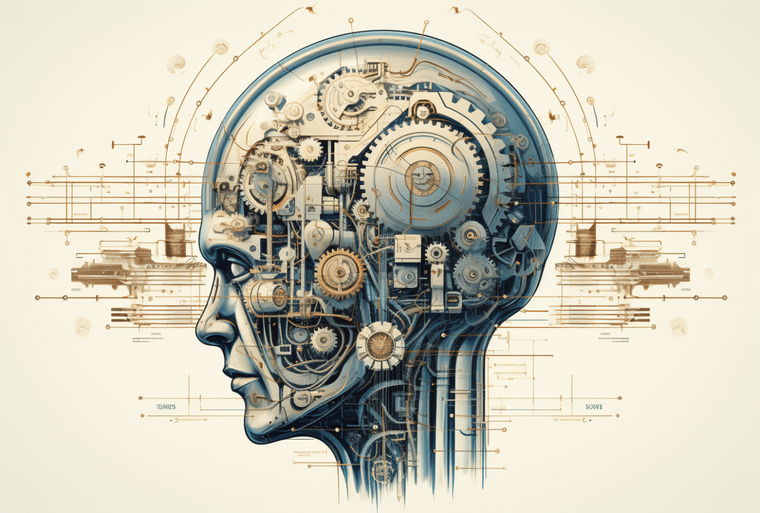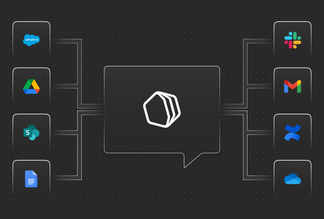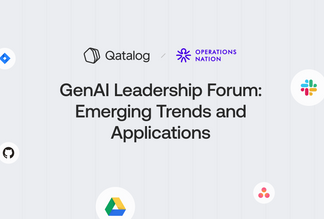
How AI changes the skills required for knowledge work
Artificial intelligence (AI) is transforming knowledge work. With large language models (LLM) already writing everything from blog posts to job applications, many industries are bracing for change.
Or at least they should be. In our research into employee perceptions of AI, we discovered a false sense of security among knowledge workers about the impact these tools will have.
It’s something we’ve called the “ChatGPT effect”. As knowledge workers become more familiar with early AI tools like ChatGPT— which currently suffer from hallucinations and other limitations — they seem less worried about its power.
Now, generative AI won’t make knowledge work obsolete. But it is likely to automate the basic, time-consuming tasks knowledge workers perform. That means the work that fills our time will change, and the skills we require and value will change with it.
In this post, we explore six skills that knowledge workers should learn today to prepare for a new world of human-AI collaboration.
Six knowledge work skills that AI is making more important
Much of the conversation around AI suggests its impact will be felt most where tasks are most repetitive and analytical. For example, it can already help us to draft emails, write code, and sift through large amounts of data.
As a result, knowledge workers are putting their valuable talents to better use. We found that 77% believe AI will help them work faster. Whether they’re marketers, developers, or designers, those who use AI effectively are likely to have more time to spend on rewarding, creative, human tasks.
But some jobs may disappear altogether, and those that remain will still have to adapt their working processes. These are the six skills that will be most important.
1. Getting the most out of AI — and doing so ethically
Firstly, the ability to use AI will be essential for knowledge workers. In a world where AI is a versatile collaborator and colleague, humans with a familiarity with these tools will be in high demand.
What are the tasks that AI performs best? How can you build it into your processes? Where does it stumble? What inputs, prompts, and guidance are necessary to get the best results? And what edits or tweaks are required by humans to improve what it produces?
It’s not just the use of AI that humans will need to grasp, but the ethics, too. For example, one of the criticisms of LLMs is that they are prone to reproducing existing prejudices. For organizations to create data, materials, and results that are free of bias, employees will need to be attuned to this risk.
2. Resilience to digital change
We haven’t even begun to see the full potential of AI. What’s so exciting about this technology is how rapidly it’s changing — and how dramatically it promises to revolutionize human progress.
But for organizations to make the most of that promise, knowledge workers need to keep up with the pace of change. And as a result, the most in-demand employees will be those who can adapt to the new technologies as they appear.
So, organizations will be looking for workers who can learn quickly to get the most from these tools — and who have an interest in pursuing their full potential. But organizations will also need to help employees gain these skills through ongoing training and support.
3. Creativity and innovation
In a workplace where AI handles the more routine and repetitive tasks, creativity will become one of the key requirements of your human employees.
Say you’re running a marketing campaign, for example. AI can certainly provide the data to help you track trends and support your ideation. But true creativity and original ideas will always be in high demand.
Would an AI have created Cadbury’s legendary ad featuring a gorilla playing the drums with no mention of chocolate whatsoever, for instance? Not a chance. But it won ad of the decade and is said to have turned the company’s fortunes around at the time.
This kind of out-of-the-box thinking may never be replicable by AI systems and highlights the enduring value of human creativity.
4. Emotional intelligence
As processes become more automated, we are likely to seek out true human connections, especially in certain scenarios and interactions where we need to be vulnerable and build trust.
For example, according to a recent study, 77% of customers prefer to speak to a human at a company over a chatbot. The same number said they found interacting with a chatbot frustrating.
Of course, as AI systems improve, this kind of frustrating experience will become much less common. But for the foreseeable future, there will be plenty of situations where there is simply no replacement for the deep emotional intelligence that humans are able to provide, largely because we are able to draw on our own lived experience, which AI systems can never have. This allows us to be more empathetic, more flexible, and better able to deal with specific, nuanced needs.
And so, in a world where AI becomes ubiquitous, those with very high emotional intelligence will become even more valuable. It’s what allows us to manage conflict, sensitively express dissatisfaction, and give genuine praise and affirmation that means something. AI can’t do that (yet).
5. Critical thinking in a data-driven workplace
AI works by finding patterns in huge quantities of data. If you’re bringing AI into your workplace, you’re inevitably giving dataa central role, too.
In this context, data literacy among human employees will become a fundamental skill. For instance, one recent study found that 85% of business executives believe that data literacy will become as basic a skill as using a computer.
The trouble is that the same study found only 11% of employees are currently fully confident in their ability to read, analyze, work with, and communicate data.
Knowledge workers need to know how to engage with and think critically about data. If AI tools can provide the necessary information and analyze patterns, it’s down to humans to consider whether there might be any potential blind spots. Is AI using a limited data set? Could it be making false assumptions? Are there other implications or alternatives? All of these factors are important in the final decision-making process.
6. Leadership in an AI era
Finally, the advent of AI brings leadership into a new phase. Many of the same skills will remain relevant — strategic planning, people management, decision-making — but this technology casts them all in a new light.
More than ever, knowledge leaders will have to manage a mix of humans and machines. This begs the questions: How will you allocate tasks between the two? And, more generally, to what extent will you leverage AI across your organization?
As a leader, you’ll also need to manage any conflict that arises here. And it’s likely that those soft skills — empathy, understanding, and communication — will make you stand out.
It’s also worth noting that it’ll be your job as a leader to ensure you have the skills and talent your business needs to thrive in the AI-powered future. As we argue in The AI Workforce, it’s time to prepare for a fierce battle for talent.
A future where AI and humans collaborate is closer than you think
This doesn’t apply to a distant future. AI is already transforming the workplace — and it’s going to happen much faster than we think. The time to prepare is now.
-
To learn more about how AI could transform the workforce, check out our white paper, The AI Workforce.
-
You can also book a demo with the Qatalog team to see how we’re leveraging the latest AI technology to help teams work faster and smarter.



